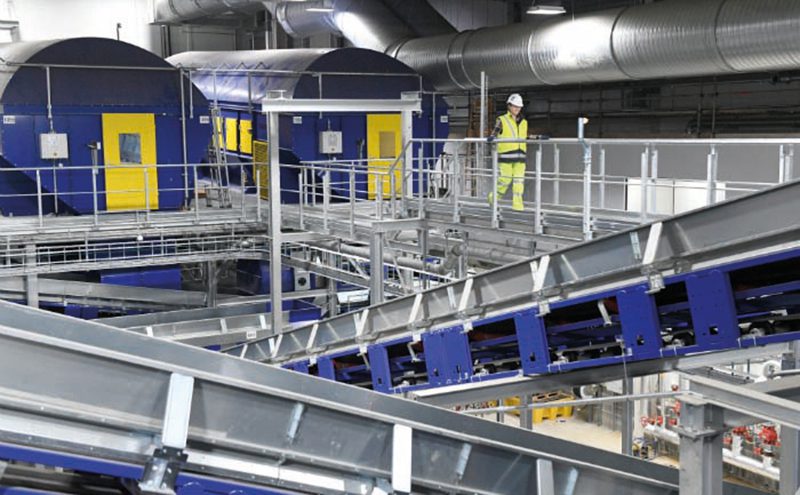Sorting systems specialist Stadler Engineering comments on what solutions need to be considered in response to China’s import ban on contaminated recyclate

Few events have had such an impact on the global recycling industry as China’s import ban on all low-grade plastic materials. Indeed, UK waste is beginning to pile up at ports and warehouses as Waste Management Facilities (WMFs) search for new ways to deal with the problem of oversupply. Further worsening the situation, China has also increased quality controls for all other waste including cardboard and paper, which places the British recycling industry under even greater pressure. The move could see local authorities turn back to landfilling or incineration.
In an attempt to deliver a solution, DEFRA recently published its 25-Year Environment Plan, outlining plans to set up a government watchdog, establish a green council and eliminate single-use plastics from the food and drink supply chain – an area where usage rates are high. While Dr. Benjamin Eule, director at sorting systems specialist Stadler Engineering, welcomes government action on the topic, he is keen to see a long-term solution brought to the table.
Eule commented: “It’s great to see solutions being offered, but it’s important to ensure we don’t simply evoke knee-jerk reactions. Plastic plays a significant part in the supply chain, arguably one that just cannot be replaced. In the food industry, plastic is essential for keeping food fresher, for longer. To ban it completely could see the UK replacing its plastic waste with food waste. Instead, we need to inspire the use and specification of recyclable plastics.”
Making a recovery
A short-term solution, which avoids the landfill route, would be to identify alternative export markets, such as Vietnam or India. However, Dr. Eule believes working towards a long-term solution is the key to future sustainability.
“China’s decision is not an isolated incident, but the start of a global movement to crackdown on poor quality plastics. As an industry, we need to get out of the mindset of export and into the mindset of reduction, re-use and recycling.
“Not all plastics can be recycled due to contamination, low-grade properties and composites, so fresh solutions for treating our waste are needed. Energy from waste (EfW) is one solution, but addressing the capacity gap is proving a challenge. Instead, improving recovery rates by enhancing collection schemes would decrease the volume of plastic still being disposed of as residual waste.”
Unfortunately, the UK has lost a significant proportion of its plastics reprocessing capacity in recent years, following the collapse of some major plastic recycling businesses, which was influenced by lower crude oil prices.
Dr. Eule continued: “Modern recycling and sorting systems are sophisticated enough to permit the kind of high quality standards demanded by China and putative markets for plastics recyclate.
“The problem is, many recycling facilities are underdeveloped and thus unable to meet these standards. We need greater investment and development in recycling efficiency to maximise national capacity, but most plants do not have the budgets to accommodate upgrades in short timescales. Government subsidies could be an option to ensure we can meet quality standards for the volumes required.”
Government subsidies could be an option to ensure we can meet quality standards…
Supporting the cause
It’s not an unreasonable request. In the past, the UK government has supported waste infrastructure development through the use of market incentives. Feed-in tariffs and levy exemption certificates have helped the country to boost its performance in anaerobic digestion, for example.
Opposition parties have been calling on the government to introduce a deposit return scheme for plastic bottles, to reduce volumes of plastic waste. The 2017 Autumn Budget also promised a review of taxes and charges on single-use plastics, demonstrating that discussions are taking place in the upper reaches of government.
Dr. Eule welcomes the time and attention that government is putting into plastics recycling and believes the onus should not be on industry alone.
“Very often product design, particularly packaging, introduces new combinations of plastic compounds and multilayer waste products, which further increase the mixed plastic problem. We need to work collaboratively to maximise the use of recyclable materials and develop a responsible attitude to waste. As a nation, we need to set out packaging guidelines that consider the entire carbon cycle.”
Education, education, education
This points to a wider need to provide further education on recyclable materials to packaging organisations, large retailers and the general public. There have been calls to introduce incentives for businesses that consciously produce recoverable packaging and plastics. Consumers also play a part. If the general public can make more informed decisions about what we are purchasing and understand the waste we are generating, it is possible to significantly reduce and potentially eliminate plastics and contamination from the supply chain altogether.
While China’s announcement came as a shock to many, it was not completely out-of-the-blue. The country has acted out against waste previously, but not in such a decisive fashion. Back in 2013, an initiative called Operation Green Fence saw China sharply increase inspections of imported bales, shipping back low-quality scrap at the expense of the exporter. Additionally, it implemented the National Sword programme in 2017 to tackle the illegal smuggling of foreign waste with close inspections of imported recyclable materials.
•Stadler Anlagenbau GmbH is a specialist in the design, build and installation of sorting systems and components.








